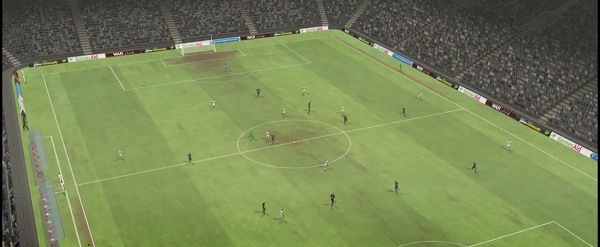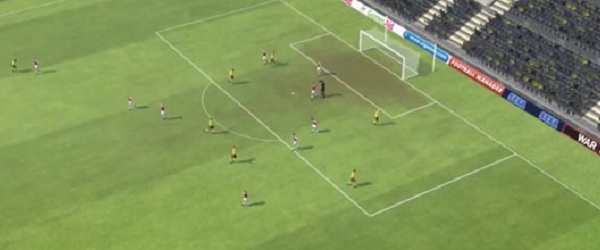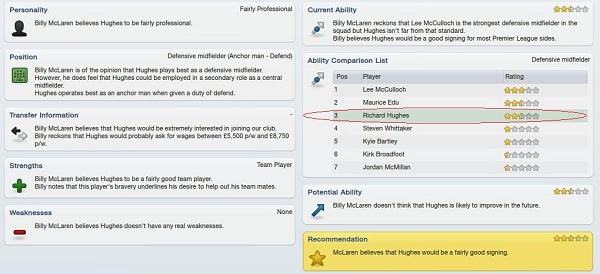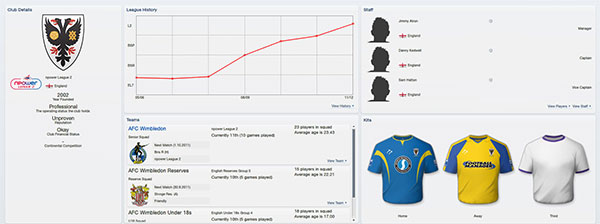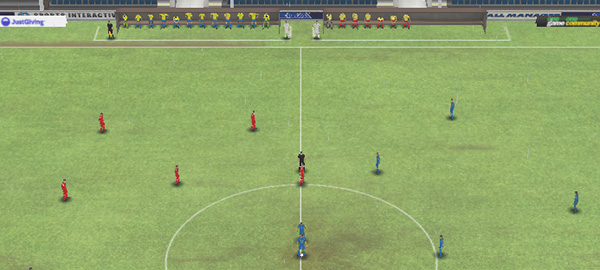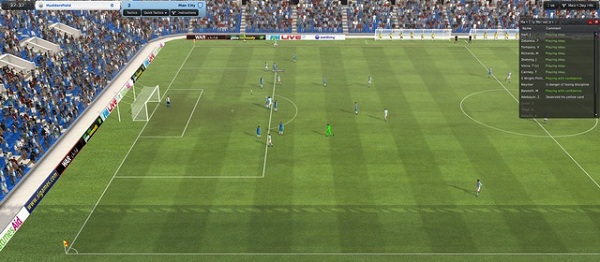Wot I Think: Football Manager 2012
Hairdryer-to-face
My proud home city of Manchester still trembles from the result of the weekend’s derby, with legions of red-shirted, red-faced men weeping openly in the streets and doubting all that they previously held true. There are far more seisimic events in the world of foot-to-ball though. I’ve been attempting to overturn the order by means of Football Manager 2012 and here’s Wot I Think.
I am one of the many and I speak with their voice, which may or may not be a System Shock 2 reference in a piece on Football Manager. Oh sod it, it is. The many I mean, of course, are those of us who are compelled to buy the new Football Manager game every year, or perhaps every two or three years, allowing it to devour a quite stupid amount of hours. Why do we do it and is it worth doing it again with the 2012 edition right now? I shall attempt to answer these questions. The latter is easy (yes), the former is far more interesting and far more complex.
Let’s go with the easy question first because it won’t take long and it’s what a lot of you are probably here for. Details on what’s changed, reasoned thoughts on whether I think those changes are for the better or not, and a few thoughts on what I’d like to see next time around.
Since most of the people who were interested have probably bought the game already, I’ll go a bit further in the second part of this meandering monologue. I’ll say something about why Football Manager is an important game to me and try to pin down its brilliance, not treating it as an anomaly enjoyed by people who otherwise use their PCs solely for watching goalkeeper goof compilations on Youtube, but fitting it into the pantheon of the games that made me and continue to define me.
Should be fun.
So, what’s different? What’s that 12 all about? It sounds like an odd thing to say in a game where you’ll spend most of your time looking at stats, sliders and words, but some of the most important changes seem purely cosmetic at first. The layout of almost every screen in the game has been completely redesigned, ensuring that there’s more useful information available at any one time and links to related data are easier to find.
This is done with more sensible use of tabs and a more intelligent pyramid structure that provides a little about a lot and allows each grouping of information to be explored further when desired or required. I’ve often found layout changes take me a couple of weeks to become fully accustomed to, time in which I seem to chase my own tail around the periphery of my squad, but this already feels like the most natural to date. It’s cleaner, it uses the resolution its provided with far more sensibly, and it cuts down on time spent back-tracking in search of specifics.
There are other visual tweaks, to the 3d match engine. Are they important? Probably not. There was a startling moment when I saw the first flare lit in the crowd and believed my entire stadium was about to turn to ashes. It didn’t, but I did lose the match 0-3. More impressive than flares is the new director camera, which selects angles during a match and actually makes watching highlights far more exciting. Yes, exciting. I am capable of being excited by tiny men on a football pitch who somewhat stubbornly and ineptly attempt to obey my screamed commands.
Their behaviour isn’t stubborn and inept because of a failing in the game itself, it’s because I’m managing NK Rudes in the Croation second division. My star player will probably earn less in his career than Wayne Rooney earns while scratching his arse and controlling a version of himself on Fifa at a press event, but they’re a loyal bunch, my Rudies.
In order to explore the workings of FM 2012, I decided to play a couple of seasons with three different clubs. First of all, Bury FC. Ideal because they’re the first team I saw live (my grandpa didn’t miss a home match except when it was considered proper to be fighting in a war) and because they won promotion last season so struggle lies in the future. Struggling is fun and the achievement of hard-won survival in a league is often more of a thrill than promotion was the season before.
Next up were the reigning Premier League champions, who are undergoing a fairly significant squad restructuring at present. That’s another part of the game I always enjoy; trying to build something with youth and prestige. I’ve been fairly successful, although the other Manchester have become the dominant force in my fictional foot-to-ball world. Managing Manchester United involves appeasing money-hungry agents and dabbling on big names in the transfer market.
Agents have been fleshed out considerably since their late arrival in the series and they're an unpleasant side of the game that it's impossible to ignore. There's also lots of new work on youth contracts, which makes building a team from near-infancy more realistic and more viable. I like the implementation of all this contractual malarkey, even if it can make tying up transfers a more drawn-out process than I'd like. It does lead to gazumping and bitter rivalry between clubs, which is all part of the fun.
Enough of the top flight though. After the Red Devils there’s NK Rudes, who handily highlight the most significant new feature in the game: the ability to add and remove playable leagues during a game, rather than only having the option at setup. Because having sixty odd playable leagues greedily eats up computing power, this is the first time in the series’ history where I’ve been able to indulge my desire to be a great nomadic manager. Starting at a random club in a league I know nothing about, my aim is to travel the world, experiencing foot-to-ball management in every timezone.
Never heard of NK Rudes? Neither had I. Here’s a quote from the club’s official website to introduce you to their particular brand of foot-to-ball.
“A few boys gathered on the meadow “Celina” was create simple “krpenjača”. “Krpenjača” is old expression for ball made of simple rags. Shortly after that came out real madness for that unusual thing which will become the most important sideshow thing on the world. New born players were roast by the parents because they were gathering football team. However love for football was too strong and every day was stronger. Boys who are kicked the ball on the meadows in Rudeš has became boys which wants bigger challenges.”
That is all you need to know about the real NK Rudes. As for my NK Rudes, we’re doing very well, thanks for asking. Mid-table mediocrity was our aim for season one and we achieved it comfortably. I’ve sold players for more than they are worth and I’ve bought young players whose value should skyrocket in coming years. I’ll hopefully jump ship to greater things in a couple of years’ time and because I can add any league, I could be heading to Korea or to the Americas, to Europe or to Australasia. That’s a very good thing because it opens up the world, allowing all kinds of stories to unfold.
And that’s what Football Manager is really all about. Narrative. As with my favourite grand strategy titles, it allows me to oversee a series of abstract numbers and names, and create entire histories and futures for them. It doesn’t just simulate football matches, or even leagues – it simulates the world of football, with all manner of details from World Cup bids to agent-player-manager relationships playing out behind the scenes.
Everything that matters is tracked somewhere and the true brilliance of that only really hits you when you realise that the only thing that really matters, what all that work was about, is putting the ball in the net. Preferably more often than the other team. For all the complexities and calculations, it’s still all about the unexpected freak goal or the fluid movement when all the planning pays off for one instant.
Sometimes I think Sports Interactive have perfected the formula and that they are essentially selling roster updates. It’s true that the main changes, switchable leagues aside, are concerned with streamlining and more helpful feedback (particularly in team talks, where the addition of 'tone' is far more useful than it might sound), but it’s enough to change the way I’ll play the game. And that’s enough to make me relegate FM 2011 to the scrapheap.
My main issue with the series remains the same though and it’s something that has only become apparent since I was introduced to Out Of The Park Baseball, which is in my view the only superior management simulation out there. What Out Of The Park does that Football Manager doesn’t, and perhaps never will, is to encompass the entire history of its chosen sport. A career can begin at the beginnings of baseball, in the 19th century, with leagues and franchises expanding and forming as history dictated. It’s even possible to randomise drafts and rule changes going into the future.
That’s not just a gimmick though, it allows the simulation engine to really show its chops, coping with wildly shifting tactics. I’m not convinced Football Manager is up to that but I’d love to see it try. I want the game equivalent of Jonathan Wilson’s excellent Inverting the Pyramid, forcing manager’s to adapt to changing tactics and styles of play, and even introducing their own, creating not just the future of foot-to-ball but recreating the history as well, Edwardian moustaches and all.
But that’s still why I love the game, because it is about creation, of tales, trouncings and triumphs. Just as it can be hard to understand the appeal of hardcore flight simulations if planes really aren’t your thing, it’s hard to understand the appeal of Football Manager without having an interest in foot-to-ball itself. There’s no better game to indulge that interest though. It’s difficult to think of any computer game that simulates specific, self-contained events in the real world in this much detail. Playing as Rudes, I am not just a backwater manager, I’m also an observer of a possible future for the game as it plays out across the globe.
In some ways, I enjoy Football Manager in the same way that I enjoy Europa Universalis. Both do a bloody good job of convincing me that my computer contains a world that operates around me but not entirely because of me. My RPG itch is even scratched to an extent, with the play between personalities and the quest for constant improvement.
A huge part of me would love to see a simulation of this depth applied to a fantasy sport, or even to geopolitics or film studio management – something potentially complex that could be reduced to statistical manipulation and tactical instruction, then elevated to the level of grand narrative. But, for now, I’ve got my foot-to-ball and I’m more than happy with it. After all, it's "the most important sideshow thing on the world". NK Rudes said so.

